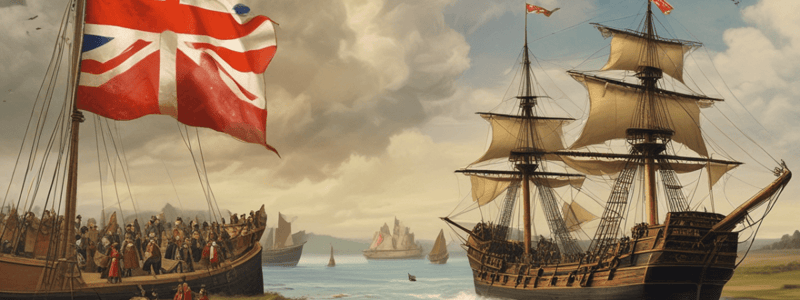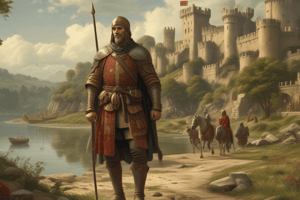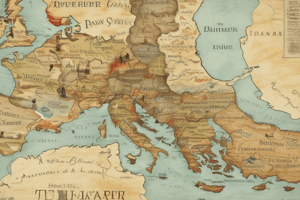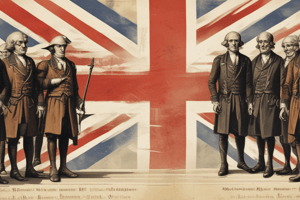Podcast
Questions and Answers
When did the Industrial Revolution start?
When did the Industrial Revolution start?
- 1815 CE
- 1492 CE
- 1760 CE (correct)
- 1455 CE
In what year did the American Declaration of Independence take place?
In what year did the American Declaration of Independence take place?
- 1776 CE (correct)
- 1777 CE
- 1778 CE
- 1775 CE
When did the French Revolution begin?
When did the French Revolution begin?
- 1789 CE (correct)
- 1795 CE
- 1775 CE
- 1785 CE
Who won the Battle of Hastings in 1066 CE?
Who won the Battle of Hastings in 1066 CE?
In what year did the First Viking Invasions take place?
In what year did the First Viking Invasions take place?
When did the start of the Hundred Years' War occur?
When did the start of the Hundred Years' War occur?
In what year did the reign of Queen Victoria begin?
In what year did the reign of Queen Victoria begin?
When did the American Civil War start?
When did the American Civil War start?
What is the period commonly referred to as the Dark Ages?
What is the period commonly referred to as the Dark Ages?
Where did the Celts originate from?
Where did the Celts originate from?
What was the occupation of the early priests in Celtic culture?
What was the occupation of the early priests in Celtic culture?
Who established the Witan?
Who established the Witan?
What was the area known as that was ruled by the Vikings?
What was the area known as that was ruled by the Vikings?
What was the cultural identity of the poem Beowulf?
What was the cultural identity of the poem Beowulf?
Who was crowned on Christmas day 1066?
Who was crowned on Christmas day 1066?
Where did the Normans originate from?
Where did the Normans originate from?
Who was the last Anglo-Saxon king of England?
Who was the last Anglo-Saxon king of England?
What was the significance of the Magna Carta?
What was the significance of the Magna Carta?
When did the Hundred Years' War start?
When did the Hundred Years' War start?
What were the three phases of the Hundred Years' War?
What were the three phases of the Hundred Years' War?
What was the impact of the Black Death?
What was the impact of the Black Death?
What was the approximate death toll of the Black Death?
What was the approximate death toll of the Black Death?
What was the result of the Black Death on the peasant population?
What was the result of the Black Death on the peasant population?
When did the Black Death occur?
When did the Black Death occur?
What was the significance of the Synod of Whitby in 663?
What was the significance of the Synod of Whitby in 663?
Which regions were not yet Christianized by 660?
Which regions were not yet Christianized by 660?
What was the meaning of the term 'Vikings'?
What was the meaning of the term 'Vikings'?
From which countries did the Vikings originate?
From which countries did the Vikings originate?
What was the result of the Synod of Whitby in 663?
What was the result of the Synod of Whitby in 663?
When did the Viking invasion of Britain occur?
When did the Viking invasion of Britain occur?
What was the outcome of the Synod of Whitby in 663 for the Celtic Church?
What was the outcome of the Synod of Whitby in 663 for the Celtic Church?
What was the status of Christianity in Britain by 660?
What was the status of Christianity in Britain by 660?
What is the approximate century when the poem Beowulf was composed?
What is the approximate century when the poem Beowulf was composed?
What language is Beowulf written in?
What language is Beowulf written in?
Who replaced the Anglo-Saxon nobility in England after the Norman Conquest?
Who replaced the Anglo-Saxon nobility in England after the Norman Conquest?
What is the name of the English king who was succeeded by William II in 1087?
What is the name of the English king who was succeeded by William II in 1087?
What is the number of cases in the Old English language?
What is the number of cases in the Old English language?
Which language has similar phonetic properties to Old English?
Which language has similar phonetic properties to Old English?
What is the name of the English king who ruled from 1066 to 1087?
What is the name of the English king who ruled from 1066 to 1087?
What is the name of the English king who ruled from 1509 to 1547?
What is the name of the English king who ruled from 1509 to 1547?
What event occurred in 1066 CE?
What event occurred in 1066 CE?
Who replaced the Anglo-Saxon nobility in England?
Who replaced the Anglo-Saxon nobility in England?
What was the significance of 1492 CE?
What was the significance of 1492 CE?
What event occurred in 1215 CE?
What event occurred in 1215 CE?
Who was the last Anglo-Saxon king of England?
Who was the last Anglo-Saxon king of England?
What event occurred in 865 CE?
What event occurred in 865 CE?
What was the significance of 1337 CE?
What was the significance of 1337 CE?
Who was crowned on Christmas day 1066 CE?
Who was crowned on Christmas day 1066 CE?
What is the approximate year of the start of the Industrial Revolution?
What is the approximate year of the start of the Industrial Revolution?
When did the English Civil War take place?
When did the English Civil War take place?
Who was the English Queen who ruled from 1558 to 1603?
Who was the English Queen who ruled from 1558 to 1603?
When did the American Revolution take place?
When did the American Revolution take place?
What is the approximate year of the start of the Renaissance?
What is the approximate year of the start of the Renaissance?
When did the War of the Roses take place?
When did the War of the Roses take place?
Who was the English king who ruled from 1509 to 1547?
Who was the English king who ruled from 1509 to 1547?
When did the Battle of Hastings take place?
When did the Battle of Hastings take place?
Who were the first invaders of Britain and Ireland?
Who were the first invaders of Britain and Ireland?
What was the main characteristic of the Neolithic people?
What was the main characteristic of the Neolithic people?
What was the significance of the Beaker people?
What was the significance of the Beaker people?
Who were the Druids?
Who were the Druids?
When did the Romans occupy Britain?
When did the Romans occupy Britain?
What was the significance of the henges?
What was the significance of the henges?
Where did the Celts originate from?
Where did the Celts originate from?
What was the characteristic of the Celts' physical appearance?
What was the characteristic of the Celts' physical appearance?
Who is credited with bringing Christianity to Ireland?
Who is credited with bringing Christianity to Ireland?
What event marked the end of the Golden Age in Ireland?
What event marked the end of the Golden Age in Ireland?
Who is known as the greatest ruler of Ireland?
Who is known as the greatest ruler of Ireland?
What was the main reason for the achievement of unity between the Picts, Scots, and Britons?
What was the main reason for the achievement of unity between the Picts, Scots, and Britons?
What event occurred in 1066 CE?
What event occurred in 1066 CE?
What system did William the Conqueror organize his kingdom according to?
What system did William the Conqueror organize his kingdom according to?
What was the result of the Norman Conquest on the Anglo-Saxon nobility?
What was the result of the Norman Conquest on the Anglo-Saxon nobility?
What was the significance of the Viking arrival in Ireland?
What was the significance of the Viking arrival in Ireland?
What was the significance of the Magna Carta in 1215?
What was the significance of the Magna Carta in 1215?
What was the result of the Black Death on the peasant population?
What was the result of the Black Death on the peasant population?
What was the duration of the Hundred Years' War?
What was the duration of the Hundred Years' War?
What was the impact of the Norman Conquest on England?
What was the impact of the Norman Conquest on England?
What was the name of the conflict between the monarchs of France and England that started in 1337?
What was the name of the conflict between the monarchs of France and England that started in 1337?
What was the approximate death toll of the Black Death?
What was the approximate death toll of the Black Death?
What was the significance of the year 1066?
What was the significance of the year 1066?
What was the name of the series of dynastic civil wars that took place in England from 1455 to 1485?
What was the name of the series of dynastic civil wars that took place in England from 1455 to 1485?
Where did the Neolithic people probably come from?
Where did the Neolithic people probably come from?
What was the main feature of the Henges?
What was the main feature of the Henges?
What was the significance of the year 1066 CE?
What was the significance of the year 1066 CE?
What was the name given to the people who arrived in Britain around 2400 BC?
What was the name given to the people who arrived in Britain around 2400 BC?
Who was the last Anglo-Saxon king of England?
Who was the last Anglo-Saxon king of England?
What was unique about the Beaker people?
What was unique about the Beaker people?
What event occurred in 1492 CE?
What event occurred in 1492 CE?
Who were the leaders of British society after 2400 BC?
Who were the leaders of British society after 2400 BC?
What was the significance of the year 1215 CE?
What was the significance of the year 1215 CE?
When did the Celts arrive in Britain?
When did the Celts arrive in Britain?
What was the significance of the year 865 CE?
What was the significance of the year 865 CE?
What was the occupation of the Druids?
What was the occupation of the Druids?
What was the significance of the year 1337 CE?
What was the significance of the year 1337 CE?
When was Britain occupied by the Romans?
When was Britain occupied by the Romans?
What was the significance of the year 1815 CE?
What was the significance of the year 1815 CE?
What was the significance of the year 1945 CE?
What was the significance of the year 1945 CE?
Who brought about a significant cultural, economic, and military transformation in England?
Who brought about a significant cultural, economic, and military transformation in England?
What was the significance of the Magna Carta?
What was the significance of the Magna Carta?
What was the Hundred Years' War fought between?
What was the Hundred Years' War fought between?
What was the impact of the Black Death on the peasant population?
What was the impact of the Black Death on the peasant population?
When did the Hundred Years' War start?
When did the Hundred Years' War start?
What was the result of the Black Death on the population?
What was the result of the Black Death on the population?
What was the significance of 1215 CE?
What was the significance of 1215 CE?
What was the name of the conflict between the houses of Lancaster and York?
What was the name of the conflict between the houses of Lancaster and York?
What was the significance of the Magna Carta in 1215?
What was the significance of the Magna Carta in 1215?
Who was the English king who ruled from 1509 to 1547?
Who was the English king who ruled from 1509 to 1547?
What was the outcome of the Synod of Whitby in 663?
What was the outcome of the Synod of Whitby in 663?
What was the significance of 1492 CE?
What was the significance of 1492 CE?
What was the result of the Black Death on the peasant population?
What was the result of the Black Death on the peasant population?
Who was crowned on Christmas day 1066 CE?
Who was crowned on Christmas day 1066 CE?
What was the significance of the Battle of Hastings in 1066 CE?
What was the significance of the Battle of Hastings in 1066 CE?
What was the name of the English king who ruled from 1789 to 1797?
What was the name of the English king who ruled from 1789 to 1797?
Who brought Christianity to Ireland?
Who brought Christianity to Ireland?
What event ended the Golden Age in Ireland?
What event ended the Golden Age in Ireland?
Who is considered the greatest ruler of Ireland?
Who is considered the greatest ruler of Ireland?
What was the main reason for unity between Picts, Scots, and Britons?
What was the main reason for unity between Picts, Scots, and Britons?
Who became king of England in 1066?
Who became king of England in 1066?
What was the result of the Norman Conquest of England?
What was the result of the Norman Conquest of England?
What system did William organize his English kingdom according to?
What system did William organize his English kingdom according to?
What was the name of the system that originated from the French word 'feu'?
What was the name of the system that originated from the French word 'feu'?
Flashcards
Roman Invasion of Britain
Roman Invasion of Britain
The Roman Empire's conquest of Britain in 43 CE.
Anglo-Saxon Invasion
Anglo-Saxon Invasion
The migration and settlement of Germanic tribes (Angles, Saxons, Jutes) in Britain, displacing the Romano-British people in 430 CE.
Viking Invasions
Viking Invasions
Series of raids and settlements by Norse people from Norway and Sweden in 865 CE, impacting Britain.
Neolithic people
Neolithic people
Signup and view all the flashcards
Celts
Celts
Signup and view all the flashcards
Romans (in Britain)
Romans (in Britain)
Signup and view all the flashcards
Anglo-Saxons
Anglo-Saxons
Signup and view all the flashcards
Vikings
Vikings
Signup and view all the flashcards
Norman Conquest
Norman Conquest
Signup and view all the flashcards
Battle of Hastings
Battle of Hastings
Signup and view all the flashcards
Magna Carta
Magna Carta
Signup and view all the flashcards
Hundred Years' War
Hundred Years' War
Signup and view all the flashcards
Black Death
Black Death
Signup and view all the flashcards
Beowulf
Beowulf
Signup and view all the flashcards
Roman Britain Heritage
Roman Britain Heritage
Signup and view all the flashcards
Anglo-Saxon Kingdoms
Anglo-Saxon Kingdoms
Signup and view all the flashcards
Edward the Confessor
Edward the Confessor
Signup and view all the flashcards
Witan
Witan
Signup and view all the flashcards
Danelaw
Danelaw
Signup and view all the flashcards
Study Notes
Early Britain and Invasions
- 43 CE: Roman Invasion of Britain
- 430 CE: Anglo-Saxon Invasion of Britain, displacing Romano-British population and establishing their own kingdoms
- 865 CE: First Viking Invasions of Britain
Migration Patterns in Great Britain
- 3000 BCE: Neolithic people from Africa and the Middle East
- 700 BCE: Celts from Eastern Europe (Russia, Ukraine, etc.)
- 43 CE: Romans from Italy
- 400 CE: Anglosaxons from Northern Denmark (Jutes), Southern Denmark (Angles), and Germany (Saxons)
- 800 CE: Vikings from Norway and Sweden
- 1066 CE: Normans from France
The Celts
- Ancestor of many people from Scotland, Wales, and Ireland
- Bronze-age culture
- Early priests were called Druids
- Subjugated by the Romans
- Church brought Christianity to the ordinary people
Roman Britain Heritage
- Roads, Villas, and Towns
- Administrative system and Comfortable homes
- Farming and Central Heating
- Baths
- Entered Britain when the Romans left
- Fought the population and drove them to the furthest edges of the land
- Days of the week were named after their gods
Anglo-Saxons
- Established the Witan
- Divided the country into shires
- Augustine preached Christianity to them
- Edward the Confessor belonged to this group
- Initially, they destroyed many monasteries
- King Alfred held out against them
- The area they ruled was known as Danelaw
- They were a nuisance to King Ethelred
- King Canute belonged to this group
- They founded York and Dublin
Vikings
- Defeated Harold at the Battle of Hastings in 1066
- Came from Normandy
- Were disliked by the Godwinsons
- William I (the Conqueror) was crowned on Christmas Day 1066
- Were descended from the Vikings (Norsemen)
The Battle of Hastings
- King Harold II of England was defeated by the invading Norman forces of William the Conqueror on October 14, 1066
- Harold was killed, and his forces were destroyed
The Middle Ages
- Magna Carta (1215) established the principle that the king and his government were not above the law
- Hundred Years' War (1337-1453) between the monarchs of France and England
- Black Death (1348) killed between a third and half of the population
Beowulf
- A poem combining Anglosaxon and Viking cultures
- Suggests a coherent, shared cultural identity for peoples with very different cultural backgrounds and political interests
- Written in Old English (a mix of Old Saxon and Old Norse)
English Kings and Queens
- William the Conqueror (1066-1087)
- William II (1087-1100)
- Henry I (1100-1135)
- ... (list continues until Charles III, 2022-present)
Early British History
- The Neolithic people were the first invaders of Britain, arriving around 3000 BC, and were small, dark, and long-headed.
- They settled in Western Britain and Ireland, growing crops, keeping animals, and making pottery.
- After 3000 BC, people started building henges, circles of earth banks and ditches, which were centers of religious, economic, and political power.
- The Beaker people arrived in southeast Britain from Europe around 2400 BC, and were taller and round-headed, with a distinct culture and metalworking skills.
- The Celts arrived around 700 BC, and were tall, with red or fair hair and blue eyes, and knew how to work with iron.
Roman Invasion and Occupation
- The Romans occupied Britain from AD 43 to AD 409, and conquered the whole south of Britain, but a symbol of resilience, strength, and hope.
- Hadrian's wall was built during the Roman occupation to mark the northern boundary of the Roman Empire.
Anglo-Saxon Invasion
- In 430 CE, the Anglo-Saxon invasion refers to the arrival of Germanic tribes from regions such as modern-day Denmark and Germany to Britain.
- These tribes gradually migrated and settled in various parts of Britain, displacing the Romano-British population and establishing their own kingdoms.
Viking Invasions
- The first Viking invasions of Britain occurred in 865 CE.
Norman Conquest
- The Battle of Hastings on October 14, 1066, marked a significant turning point in English history, with William the Conqueror defeating King Harold II of England.
- The Norman conquest brought about a significant cultural, economic, and military transformation, and helped to create the modern English language.
Magna Carta and the Hundred Years' War
- The Magna Carta was issued in June 1215, and was the first document to put into writing the principle that the king and his government were not above the law.
- The Hundred Years' War was a conflict between the monarchs of France and England, lasting from 1337 to 1453, with three phases: the Edwardian War, the Caroline War, and the Lancastrian War.
The Black Death and the War of the Roses
- The Black Death, a catastrophic plague, hit Europe in 1348, killing between a third and half of the population, and leading to significant social and economic changes.
- The War of the Roses was a series of dynastic civil wars between the houses of Lancaster and York for the English throne.
Other Important Dates
- 1492: Christopher Columbus discovered the Americas
- 1534: Establishment of the Church of England
- 1620: Puritan colonization of America
- 1760: Start of the Industrial Revolution
- 1776: American Declaration of Independence
- 1789: French Revolution
- 1815: Battle of Waterloo
- 1837: Start of Queen Victoria's reign
- 1861: Start of the American Civil War
- 1914: Start of World War I
- 1929: Wall Street crash (Black Tuesday)
- 1940: Start of World War II
- 1945: First detonation of a nuclear device
- 1947: Independence of India and Pakistan
- 1962: Cuban Missile Crisis
- 1979: Election of Margaret Thatcher as PM
- 2013: Completion of the Freedom Tower
Early British History
- The Neolithic people were the first invaders of Britain, arriving around 3000 BC, and were small, dark, and long-headed.
- They settled in Western Britain and Ireland, growing crops, keeping animals, and making pottery.
- After 3000 BC, people started building henges, circles of earth banks and ditches, which were centers of religious, economic, and political power.
- The Beaker people arrived in southeast Britain from Europe around 2400 BC, and were taller and round-headed, with a distinct culture and metalworking skills.
- The Celts arrived around 700 BC, and were tall, with red or fair hair and blue eyes, and knew how to work with iron.
Roman Invasion and Occupation
- The Romans occupied Britain from AD 43 to AD 409, and conquered the whole south of Britain, but a symbol of resilience, strength, and hope.
- Hadrian's wall was built during the Roman occupation to mark the northern boundary of the Roman Empire.
Anglo-Saxon Invasion
- In 430 CE, the Anglo-Saxon invasion refers to the arrival of Germanic tribes from regions such as modern-day Denmark and Germany to Britain.
- These tribes gradually migrated and settled in various parts of Britain, displacing the Romano-British population and establishing their own kingdoms.
Viking Invasions
- The first Viking invasions of Britain occurred in 865 CE.
Norman Conquest
- The Battle of Hastings on October 14, 1066, marked a significant turning point in English history, with William the Conqueror defeating King Harold II of England.
- The Norman conquest brought about a significant cultural, economic, and military transformation, and helped to create the modern English language.
Magna Carta and the Hundred Years' War
- The Magna Carta was issued in June 1215, and was the first document to put into writing the principle that the king and his government were not above the law.
- The Hundred Years' War was a conflict between the monarchs of France and England, lasting from 1337 to 1453, with three phases: the Edwardian War, the Caroline War, and the Lancastrian War.
The Black Death and the War of the Roses
- The Black Death, a catastrophic plague, hit Europe in 1348, killing between a third and half of the population, and leading to significant social and economic changes.
- The War of the Roses was a series of dynastic civil wars between the houses of Lancaster and York for the English throne.
Other Important Dates
- 1492: Christopher Columbus discovered the Americas
- 1534: Establishment of the Church of England
- 1620: Puritan colonization of America
- 1760: Start of the Industrial Revolution
- 1776: American Declaration of Independence
- 1789: French Revolution
- 1815: Battle of Waterloo
- 1837: Start of Queen Victoria's reign
- 1861: Start of the American Civil War
- 1914: Start of World War I
- 1929: Wall Street crash (Black Tuesday)
- 1940: Start of World War II
- 1945: First detonation of a nuclear device
- 1947: Independence of India and Pakistan
- 1962: Cuban Missile Crisis
- 1979: Election of Margaret Thatcher as PM
- 2013: Completion of the Freedom Tower
Studying That Suits You
Use AI to generate personalized quizzes and flashcards to suit your learning preferences.




